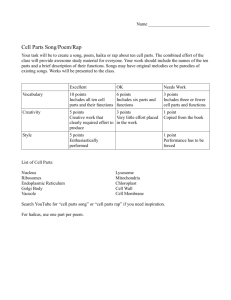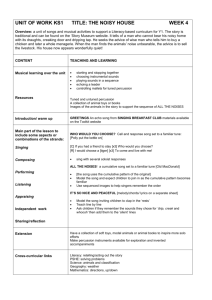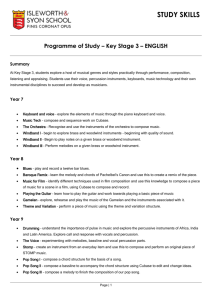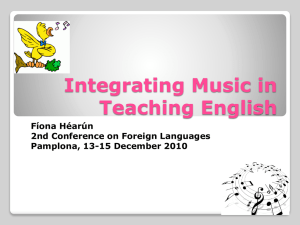year 5 and 6 music autumn cycle b
advertisement
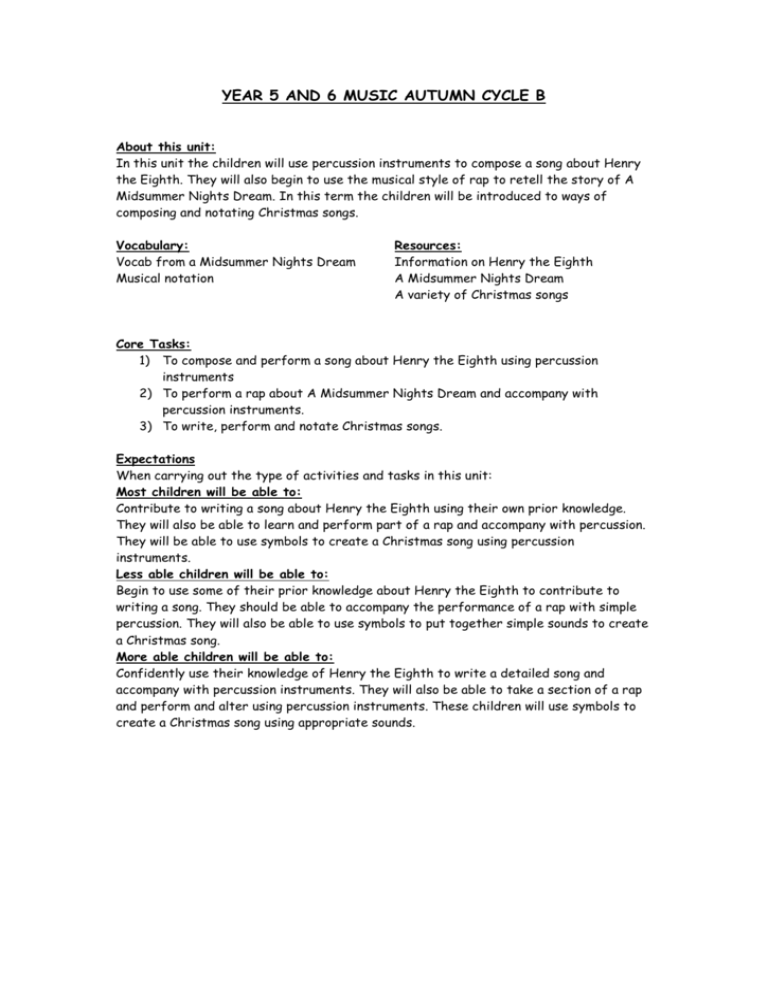
YEAR 5 AND 6 MUSIC AUTUMN CYCLE B About this unit: In this unit the children will use percussion instruments to compose a song about Henry the Eighth. They will also begin to use the musical style of rap to retell the story of A Midsummer Nights Dream. In this term the children will be introduced to ways of composing and notating Christmas songs. Vocabulary: Vocab from a Midsummer Nights Dream Musical notation Resources: Information on Henry the Eighth A Midsummer Nights Dream A variety of Christmas songs Core Tasks: 1) To compose and perform a song about Henry the Eighth using percussion instruments 2) To perform a rap about A Midsummer Nights Dream and accompany with percussion instruments. 3) To write, perform and notate Christmas songs. Expectations When carrying out the type of activities and tasks in this unit: Most children will be able to: Contribute to writing a song about Henry the Eighth using their own prior knowledge. They will also be able to learn and perform part of a rap and accompany with percussion. They will be able to use symbols to create a Christmas song using percussion instruments. Less able children will be able to: Begin to use some of their prior knowledge about Henry the Eighth to contribute to writing a song. They should be able to accompany the performance of a rap with simple percussion. They will also be able to use symbols to put together simple sounds to create a Christmas song. More able children will be able to: Confidently use their knowledge of Henry the Eighth to write a detailed song and accompany with percussion instruments. They will also be able to take a section of a rap and perform and alter using percussion instruments. These children will use symbols to create a Christmas song using appropriate sounds. Year 5 and 6 Music Cycle B Autumn Term Learning Objectives To compose and perform a song abut Henry the Eighth using percussion instruments To learn and accompany a rap about ‘A Midsummer Night’s Dream’ by William Shakespeare. Use of percussion instruments and voice. To write and perform Christmas songs. Possible Teaching Activities Discuss Henry the Eighth and his life and record notes. The children should then choose a style of performance, a song, a poem and accompaniment or a rap. In small groups children should write and compose a piece of music about Henry thinking about how the words fit with the music. If they are writing a song they should consider the complexity of their tune, e.g. is it easy to sing along to? Is it too high, too low, too difficult? The groups should practise and perform to the class. The piece will then be recorded and played back for appraisal. Discuss the story of ‘A Midsummer Night’s Dream’ and then compose a rap as a class to tell the story. As this rap will be long, in groups children should take a small part of the rap and practice their vocals. Once practised the class come back together and perform their parts. Children should then begin to put accompaniment to their rap using percussion instruments of their choice. They should notate their rap script and indicate and musical accompaniment using symbol form. Bring all the groups back together and perform the whole rap together as a class, each group performing their part. Record and play back for appraisal. Look at pictures relating to Christmas, e.g. Santa, angels, presents etc. Discuss possible musical accompaniment for each one. In groups children to choose one Christmas novelty to compose its accompaniment. As a class look at how to arrange the symbols of novelties and play it Learning Outcomes To write and perform a song or rap about Henry the Eighth using percussion instruments To create and perform a rap to tell the story of a Shakespeare play using percussion instruments. Composing, notating and performing a Christmasstyle piece of music. as a written piece of music. Again in groups children should compose a short piece of music to represent each Christmas novelty and then arrange the symbols in a chosen way in order to play as a whole Christmas composition. Record and playback. Children should listen out and try to identify which music goes with which Christmas novelty. YEAR 5 AND 6 MUSIC SPRING CYCLE B About this unit: In this unit the children will explore the styles of African music and perform chants, learn drumming rhythms and produce their own song composition using a range of instruments. Vocabulary: Tribal chant African drumming Resources: A variety of African music Bongo and African drums Core Tasks: 1) To compose and perform an African Tribal chant. 2) To learn the style of African drumming and perform the rhythms in sequence. 3) To write a song or rap using all the African elements learnt throughout the topic. Expectations When carrying out the type of activities and tasks in this units: Most children will be able to: Listen to and identify the features of African music. They will then be able to use these elements in their own compositions. They will be able to use this knowledge to compose a short song about what they have learnt using the appropriate musical elements. Less able children will be able to: Begin to understand the features of African music and contribute to class chanting and drumming rhythms. They will also contribute ideas towards a song about Kenya and accompany with percussion instruments. More able children will be able to: Confidently join in with class chanting and drumming rhythms, using an understanding of the features of African music. They will also use this understanding to compose a song about all that they have learnt using percussion instruments. Year 5 and 6 Music Cycle B Spring Term Learning Objectives To listen to and become aware of the elements of African music To listen, compose and perform an African tribal chant. To learn the style of African drumming rhythms and perform Song writing using African elements learnt and crosscurricular knowledge about the Gambia. Possible Teaching Activities Listen to a variety of African music and identify the elements of its style. Record notes for children to write up and present. Listen to examples of African tribal music and identify key features of the style. Children should learn an African chant and perform as a whole class using percussion instruments. Children, in groups, should then create their own chant using words given to them and accompany with appropriate percussion instruments. Perform to the whole class and record. Listen to examples of African drumming and discuss the rhythms. Can any of the children reproduce the rhythms using the drum? Learn rhythms using ‘jembye drum’ chant. Practise and perform as a whole class. Give children a range of different rhythms to use and in groups they should put together the rhythms to form a rhythmical composition. Practise and perform to the class. Other children should be able to identify each rhythm and play it back. Discuss what children have learnt in their topic about Kenya and record noted for children to use. In groups they should collect this knowledge and begin to write a song or rap expressing this knowledge. They should think about their accompaniment and use the African drumming and chanting techniques that they have previously learnt to accompany their voices. Learning Outcomes To become aware of the elements of African music. To use African words to create an original chant accompanied by percussion. To use African drumming techniques to create a composition for performance. To use knowledge of the subject and techniques learnt about African style music to compose a song or rap. Notation of sounds. Children should discuss a way of notating their work using words and symbols to represent their sounds. This should be presented in order to be used as display. Practise and perform. Record and play back for appraisal. YEAR 5 AND 6 MUSIC SUMMER TERM CYCLE B About this unit: In this unit the children will use the stimulus of their own local area t create musical compositions. They will take the ideas from the school environment to write a song about their time at school. They will also work with creating sound effects. Vocabulary: Sound effects Resources: Words about the school Different places in the area to use as stimulus Core Tasks: 1) Write a song using the school as stimulus. Use percussion and voices. 2) Create sounds to represent element of the surrounding area and arrange them to make a composition. Expectations When carrying out the type of activities and tasks in this unit: Most children will be able to: To use ideas about their own school environment to write a short song using a simple structure using percussion instruments. They will also be able to create simple sound effects to represent elements of their surrounding area. Less able children will be able to: Begin to contribute ideas towards the composition of a song for the school. They will also contribute some ideas towards creating some sound effects to represent the elements of the surrounding area. More able children will be able to: Confidently put forward ideas towards writing a song about the school following a structure. They will incorporate percussion instruments and create some good sound effects to be arranged together to make a composition to represent elements of the surrounding area. YEAR 5 AND 6 MUSIC SUMMER TERM CYCLE B Learning Objectives To write a song using the school as a stimulus. Using percussion instruments and voices. Create sounds to represent elements of the surrounding area and put together as a composition. Possible Teaching Activities Discuss the school and make class notes about good points they can name about the school. In groups children should put all this knowledge together and write lyrics for either a song or rap. Children to think about how to accompany their songs and also how to notate their sounds using words and symbols. Their composition should be presented as a picture notation for display. Practise, perform and record. Discuss the elements of the local area and note down children’s responses. Collect about ten different places and think of a sound effect from each one. In groups children should arrange their places and sounds into the order that they choose and practise putting the sound effects together in that order. They should notate their work using picture and sound symbols. Practise, perform and record for appraisal. Other children should clearly be able to hear each sound. Learning Outcomes Use the school as a stimulus to compose a song or rap using percussion as an accompaniment. Notate work using symbols. To compose and perform a piece of instrumental music using the local area as a stimulus. Use of percussion instruments and notation of sounds.
